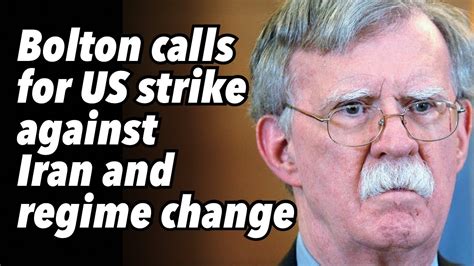
Former U.S. National Security Advisor John Bolton asserted that the Iranian regime is “in trouble” following recent U.S. strikes in Syria, arguing that these actions, while limited, demonstrate a resolve that was perceived as lacking under previous policies. Bolton made the comments in an interview on Friday, contending the strikes signal a potential shift in U.S. strategy toward Iran and its proxies in the region.
The strikes, which targeted facilities used by Iran-backed militia groups, were conducted in response to a series of attacks against U.S. forces in Iraq and Syria. The Biden administration has stated that the strikes were intended to deter further aggression and protect American personnel. Bolton, however, believes that the strikes represent more than just a retaliatory measure; he sees them as an indication of internal instability within Iran.
“I think the regime in Tehran is in trouble, and I think they understand it. The fact that they are continuing these attacks on American forces and facilities in Iraq and Syria shows, I think, an understanding on their part that this administration is not going to react in a way that will impose costs on them,” Bolton said. He further added that the Iranian leadership views the U.S. response as weak and insufficient to deter their actions.
Bolton emphasized that the Iranian regime is facing significant internal challenges, including economic difficulties, social unrest, and political divisions. He argued that these internal pressures, combined with a perceived lack of strong U.S. opposition, have emboldened Iran to continue its destabilizing activities in the region. “I think the attacks on American forces are a sign of their internal weakness and an effort to demonstrate strength,” he noted.
The former national security advisor also criticized the Biden administration’s approach to Iran, particularly its efforts to revive the 2015 nuclear deal, formally known as the Joint Comprehensive Plan of Action (JCPOA). Bolton has long been a staunch opponent of the JCPOA, arguing that it does not adequately address Iran’s nuclear ambitions or its support for terrorism.
“The Biden administration’s pursuit of a revived nuclear deal has only emboldened the regime. They see it as a sign of weakness and a willingness to appease them,” Bolton stated. He believes that a more assertive U.S. policy, including the credible threat of military force, is necessary to deter Iran’s aggressive behavior and prevent it from acquiring nuclear weapons.
Bolton’s remarks come at a time of heightened tensions in the Middle East. In recent months, there has been a surge in attacks against U.S. forces and their allies in Iraq and Syria, which Washington has attributed to Iran-backed militia groups. These attacks have raised concerns about a potential escalation of conflict in the region. The U.S. has repeatedly warned Iran that it will take action to protect its forces and interests.
The debate over U.S. policy toward Iran has been ongoing for decades, with different administrations pursuing different approaches. The Trump administration, under which Bolton served as national security advisor, adopted a policy of “maximum pressure” on Iran, imposing crippling economic sanctions and withdrawing from the JCPOA. The Biden administration has sought to revive the nuclear deal while also pushing back against Iran’s destabilizing activities.
Bolton’s perspective highlights a broader concern among some policymakers and analysts that the current U.S. strategy is not effectively deterring Iran’s aggressive behavior. He argues that a more robust and assertive approach is needed to counter Iran’s influence and prevent it from further destabilizing the region.
The recent U.S. strikes in Syria, while limited in scope, have sparked renewed debate about the effectiveness of U.S. policy toward Iran. Some analysts believe that the strikes send a strong message of deterrence, while others argue that they are insufficient to change Iran’s behavior. Bolton’s comments underscore the complexity of the challenge and the need for a comprehensive strategy to address Iran’s nuclear ambitions and its destabilizing activities in the region.
Expanded Context and Analysis:
John Bolton’s assessment of the Iranian regime’s current state as “in trouble” following U.S. strikes is rooted in his long-held views on Iran’s internal vulnerabilities and the perceived weakness of U.S. policy under successive administrations. His perspective is not merely a reaction to a singular event, but rather a culmination of his observations and analyses of Iranian behavior over several decades.
Bolton’s stance is informed by several key factors:
-
Internal Weaknesses of the Iranian Regime: Bolton has consistently argued that the Iranian regime is plagued by internal problems, including a struggling economy, widespread corruption, and growing social unrest. The economic sanctions imposed by the Trump administration, which Bolton strongly supported, exacerbated these problems, leading to increased public discontent and protests. He believes these internal pressures make the regime more vulnerable to external pressure.
-
Perception of U.S. Weakness: A central tenet of Bolton’s foreign policy philosophy is that strength and resolve are essential for deterring adversaries. He believes that the Iranian regime perceives the Biden administration’s efforts to revive the JCPOA as a sign of weakness and a lack of willingness to confront Iran’s aggressive behavior. This perception, according to Bolton, emboldens Iran to continue its destabilizing activities in the region.
-
Ineffectiveness of the JCPOA: Bolton has been a vocal critic of the JCPOA, arguing that it does not adequately address Iran’s nuclear ambitions or its support for terrorism. He believes that the deal provided Iran with billions of dollars in sanctions relief without effectively preventing it from pursuing nuclear weapons. He argues that the JCPOA should be abandoned in favor of a more comprehensive strategy that addresses all aspects of Iran’s behavior.
-
Need for a Credible Military Threat: Bolton believes that the only way to effectively deter Iran is through the credible threat of military force. He argues that the U.S. should make it clear that it is prepared to use military force to prevent Iran from acquiring nuclear weapons or engaging in aggressive behavior. He sees the recent U.S. strikes in Syria as a step in the right direction, but believes that a more sustained and assertive approach is needed.
Historical Context of U.S.-Iran Relations:
To fully understand Bolton’s perspective, it is essential to consider the historical context of U.S.-Iran relations. The relationship between the two countries has been fraught with tension and conflict since the 1979 Iranian Revolution, which ousted the U.S.-backed Shah and established an Islamic Republic.
In the decades since the revolution, the U.S. and Iran have been adversaries on numerous fronts. The U.S. has accused Iran of supporting terrorism, developing nuclear weapons, and destabilizing the Middle East. Iran, in turn, has accused the U.S. of interfering in its internal affairs, supporting its enemies, and imposing unjust sanctions.
The JCPOA, negotiated in 2015, was intended to resolve the long-standing dispute over Iran’s nuclear program. Under the deal, Iran agreed to limit its nuclear activities in exchange for sanctions relief. However, the deal was controversial from the start, with critics arguing that it did not go far enough to prevent Iran from acquiring nuclear weapons.
In 2018, the Trump administration withdrew the U.S. from the JCPOA and reimposed sanctions on Iran. The administration argued that the deal was flawed and that a more comprehensive approach was needed to address Iran’s behavior. The Biden administration has sought to revive the JCPOA, but has faced significant obstacles, including Iran’s demand for guarantees that the U.S. will not withdraw from the deal again.
Impact of U.S. Strikes in Syria:
The recent U.S. strikes in Syria targeted facilities used by Iran-backed militia groups, which have been responsible for a series of attacks against U.S. forces and their allies in Iraq and Syria. The strikes were intended to deter further aggression and protect American personnel.
The strikes have been met with mixed reactions. Some analysts believe that they send a strong message of deterrence to Iran and its proxies. Others argue that they are insufficient to change Iran’s behavior and that a more comprehensive strategy is needed.
Bolton’s comments suggest that he believes the strikes are a positive step, but that they must be followed by a more sustained and assertive approach to deter Iran. He argues that the U.S. must make it clear that it is prepared to use military force to protect its interests and prevent Iran from acquiring nuclear weapons.
Alternative Perspectives:
It is important to note that Bolton’s perspective is not universally shared. Many analysts and policymakers have different views on how to best address the challenges posed by Iran.
Some argue that a diplomatic approach, including a revived JCPOA, is the most effective way to prevent Iran from acquiring nuclear weapons and de-escalate tensions in the region. They believe that sanctions and military threats are counterproductive and can lead to unintended consequences.
Others argue that a more targeted approach, focusing on countering Iran’s destabilizing activities in the region, is the best way to contain its influence. They believe that the U.S. should work with its allies to push back against Iran’s proxies and support regional stability.
Conclusion:
John Bolton’s assessment that the Iranian regime is “in trouble” following U.S. strikes is based on his long-held views on Iran’s internal vulnerabilities and the perceived weakness of U.S. policy. His perspective is informed by his belief that the Iranian regime is facing significant internal challenges, that it perceives the U.S. as weak, and that a more assertive approach, including the credible threat of military force, is needed to deter Iran’s aggressive behavior.
While Bolton’s perspective is not universally shared, it highlights the complexity of the challenge and the need for a comprehensive strategy to address Iran’s nuclear ambitions and its destabilizing activities in the region. The debate over U.S. policy toward Iran is likely to continue for the foreseeable future, as policymakers grapple with how to best protect U.S. interests and promote stability in the Middle East.
The Path Forward:
Navigating the complex dynamics of U.S.-Iran relations requires a multifaceted approach that combines elements of diplomacy, deterrence, and pressure. A successful strategy must address both Iran’s nuclear ambitions and its destabilizing activities in the region. Some potential elements of such a strategy include:
-
Strengthening Deterrence: The U.S. must maintain a strong military presence in the region and make it clear that it is prepared to use force to protect its interests and deter Iranian aggression. This includes enhancing the capabilities of U.S. forces and working with allies to strengthen regional security.
-
Targeting Iran’s Proxies: The U.S. should continue to target Iran’s proxies in the region, including Hezbollah in Lebanon, Hamas in Gaza, and the Houthis in Yemen. This includes providing support to regional partners who are fighting against these groups and imposing sanctions on individuals and entities that support them.
-
Addressing Iran’s Internal Vulnerabilities: The U.S. should continue to support the Iranian people in their struggle for freedom and democracy. This includes providing support to human rights activists, promoting freedom of expression, and exposing the regime’s corruption and human rights abuses.
-
Maintaining Diplomatic Options: While a revived JCPOA may not be the ideal solution, the U.S. should remain open to diplomatic engagement with Iran, provided that any agreement addresses all of its concerns and prevents Iran from acquiring nuclear weapons.
-
Building a Regional Coalition: The U.S. should work with its allies in the region to build a strong coalition to counter Iran’s influence. This includes strengthening security cooperation, promoting economic integration, and resolving regional conflicts.
Ultimately, the success of any U.S. strategy toward Iran will depend on a combination of factors, including the strength of U.S. resolve, the effectiveness of its deterrence, and the willingness of its allies to work together to counter Iran’s influence.
The Role of Public Opinion:
Public opinion in both the U.S. and Iran also plays a significant role in shaping the relationship between the two countries. In the U.S., there is a broad consensus that Iran poses a threat to U.S. interests, but there is disagreement on how to best address that threat.
Some Americans support a more hawkish approach, advocating for the use of military force to prevent Iran from acquiring nuclear weapons. Others favor a more diplomatic approach, arguing that sanctions and military threats are counterproductive.
In Iran, public opinion is more divided. While many Iranians are critical of the U.S., there is also a strong desire for better relations with the West. Many Iranians believe that the country’s economic problems are due to government mismanagement and corruption, rather than U.S. sanctions.
The Iranian government has sought to portray the U.S. as an enemy of the Iranian people, but this narrative has not been entirely successful. Many Iranians are skeptical of the government’s claims and believe that improved relations with the U.S. would benefit the country.
The Future of U.S.-Iran Relations:
The future of U.S.-Iran relations remains uncertain. While the Biden administration has expressed a desire to revive the JCPOA, significant obstacles remain. The Iranian government has demanded guarantees that the U.S. will not withdraw from the deal again, and the U.S. has been reluctant to provide such guarantees.
Even if the JCPOA is revived, it is unlikely to resolve all of the issues between the U.S. and Iran. The two countries still have significant disagreements on a range of issues, including Iran’s support for terrorism, its human rights record, and its role in regional conflicts.
It is possible that the U.S. and Iran could reach a modus vivendi, in which they agree to disagree on certain issues but cooperate on others. However, such an outcome would require a significant shift in attitudes on both sides.
In the meantime, the U.S. and Iran are likely to remain adversaries, competing for influence in the Middle East and engaging in proxy conflicts. The risk of a direct military confrontation between the two countries remains a concern.
Frequently Asked Questions (FAQs):
-
What is John Bolton’s assessment of the Iranian regime following recent U.S. strikes in Syria?
- John Bolton believes the Iranian regime is “in trouble” following the U.S. strikes in Syria. He argues these strikes, though limited, demonstrate a resolve he perceived as lacking under previous policies, signaling a potential shift in U.S. strategy.
-
Why does Bolton believe the Iranian regime is in trouble?
- Bolton believes the regime is facing significant internal challenges like economic difficulties, social unrest, and political divisions. He thinks a perceived weak U.S. response has emboldened Iran, and the attacks on American forces are a sign of internal weakness masked as strength.
-
What is Bolton’s opinion on the Biden administration’s approach to Iran, particularly regarding the JCPOA?
- Bolton is critical of the Biden administration’s pursuit of a revived JCPOA. He views it as a sign of weakness that emboldens the regime, arguing that a more assertive U.S. policy, including a credible threat of military force, is necessary.
-
What were the recent U.S. strikes in Syria targeting, and why were they conducted?
- The strikes targeted facilities used by Iran-backed militia groups in response to a series of attacks against U.S. forces in Iraq and Syria. The Biden administration stated the strikes were intended to deter further aggression and protect American personnel.
-
What is the historical context of the U.S.-Iran relations, and how does it influence Bolton’s perspective?
- The U.S.-Iran relationship has been fraught with tension since the 1979 Iranian Revolution. Bolton’s perspective is influenced by this history, his belief in a strong U.S. stance, and his opposition to the JCPOA, which he views as inadequate in addressing Iran’s nuclear ambitions and support for terrorism.
-
What internal weaknesses does Bolton believe are plaguing the Iranian regime?
- Bolton believes the Iranian regime is facing a struggling economy, widespread corruption, and growing social unrest, exacerbated by economic sanctions.
-
What actions does Bolton suggest the U.S. take to counter Iran’s influence effectively?
- Bolton suggests strengthening deterrence through a credible military threat, targeting Iran’s proxies, addressing Iran’s internal vulnerabilities by supporting the Iranian people, maintaining diplomatic options with clear conditions, and building a regional coalition against Iranian influence.
-
Besides Bolton’s perspective, what alternative viewpoints exist on addressing challenges posed by Iran?
- Other viewpoints include prioritizing diplomacy through a revived JCPOA to prevent nuclear weapons and de-escalate tensions or adopting a targeted approach to counter Iran’s regional destabilizing activities with regional partners.
-
How do public opinions in the U.S. and Iran affect the relations between the two countries?
- In the U.S., a consensus exists that Iran poses a threat, but opinions diverge on addressing it, from hawkish military approaches to diplomatic solutions. In Iran, views are divided between criticism of the U.S. and desire for better relations with the West, often blaming economic issues on government mismanagement rather than solely on U.S. sanctions.
-
What is the likely future of U.S.-Iran relations considering the current tensions and the challenges in reviving the JCPOA?
- The future remains uncertain with obstacles in JCPOA revival and continued disagreements. A possibility is a modus vivendi with cooperation on select issues, though the risk of conflict remains amid competition for influence in the Middle East.









